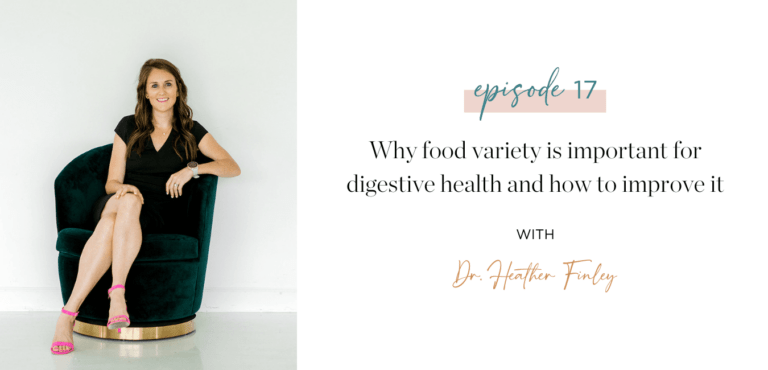Are you providing your gut with enough variety?
Often, when we experience digestive symptoms, we’re told that certain foods are “good” or “bad.” This can worsen symptoms while also introducing an unnecessary food fear.
In this episode of the Love Your Gut Podcast, I talk about The importance of food variety on gut health, the impact of gut health on the rest of the body and the brain, and the modifications you can make to improve your gut health.
Topics Covered in This Episode:
- Diversity on the plate equals diversity in the gut.
- Other things that impact diversity over time
- Long-term eating disorder or long-term dieting.
- Long-term antibiotic use.
- Smoking.
- C-section delivery.
- Poor sleep quality.
- A sedentary lifestyle.
- Artificial sweeteners.
- Generally sterile environments.
- Bacterial diversity and its impact on the brain – here are some modifications you can try:
- Take inventory of what you eat daily.
- Make small shifts – even if it’s only one food shift per week.
- If you’re trying a new food, don’t try anything else new for the day.
- Don’t try a new food if your stress is higher or you’re not sleeping well.
- Consider foods that have been positive in the past.
- Practice gratitude.
- What’s normal:
- Some bloating will be normal.
Many common digestive symptoms can be resolved by introducing variety into your diet. With greater bacterial diversity in the gut comes improved health throughout the body, and especially the brain, which, in turn, improves gut health.
If this episode has been helpful, DM me on Instagram, and tell me about your experience!
Quotes:
- “If your thoughts are negative about food, this is going to affect how you digest the food as well.” [14:23]
- “Your gut is a muscle and you don’t want to do the same exercise every single day.” [11:51]
Resources Mentioned:
The Human Gut Project
Ep. 12 – Overcoming food fear & changing your mindset to improve digestive symptoms
Connect with Dr. Heather
Follow the Podcast
Follow Along on Instagram
Follow Along on Facebook
Follow & Review on Apple Podcasts
Are you following my podcast? If you’re not, I want to encourage you to do that today so you don’t miss any future episodes! I would also appreciate it if you would leave me a review on Apple Podcasts or Spotify! I read each of them, and they help me make sure I am providing the content that you love to hear!
TRANSCRIPTION:
SPEAKERS
Dr. Heather Finley
Dr. Heather Finley 00:00
is it’s really not uncommon that clients come to us in that same situation where they’ve gone to a practitioner, they were put on a really restrictive elimination diet, and then their symptoms are even worse. But yet, their food fear is so bad that they’re scared to add things back in because they think, “Oh, well, maybe if I add things back in, the symptoms will be even worse than they are now”.
Dr. Heather Finley 00:25
Hey, welcome to the love your gut podcast. I’m your host, Dr. Heather Finley, I know what you’re thinking, how am I supposed to love my gut when all it does is hold me back. I thought the same thing before I found my own relief from my own gut health issues. I dedicated my life to getting to the bottom of my own gut issues, so I can help women just like you transform theirs. Now I’m here to guide you through your own gut health journey. We do this through identifying your root causes and making sustainable and transformational changes. As a result, you can unleash your true potential. My goal is to empower you with the information and tools you need to love your gut. So it loves you back right here on this podcast.
Dr. Heather Finley 01:08
Hello, hello, and welcome back to the next episode of the love your gut podcast. I am so excited to record this episode, I’m actually frantically getting ready for a vacation. And this topic came up as I was preparing all the things for vacation, if you’ve ever gotten ready for vacation with multiple children, it is an Olympic sport. And so that is not what we’re talking about today. But as I was getting ready to pack everything for this trip that we’re taking, I was reminded of my past struggle with digestive issues and just how much I would stress about symptoms and how the restricted diet that I was on would inhibit me from really enjoying the vacation. And if you’ve listened to Episode One, you heard a bit about my story and some experiences that I had on vacation that were slightly dramatic with my digestive symptoms. But what I want to talk about today, and what I want to help you with, which is something that I know so many of our clients struggle with is food variety, and why food variety is so important for your digestive health, and how to improve it. Because at the end of the day, we have to improve the variety of foods that you’re eating and staying on a restrictive diet is really not what we want long term for gut health. So I want you to think about a kid maybe in your life that you know of that is a picky eater. Maybe this is the kid that only eats chicken fingers or pizza, whenever they go out to eat or is always having to bring a special meal somewhere. And just how much of a pain this can be. So your gut bacteria are kinda like these picky kids. They really like specific foods. And you have so many different types of gut bacteria. And they all want to eat something different. They’re all the picky kids, and they all have different preferences. So when you are eating five different foods, this is starving out the ones that don’t like the five different foods that you’re eating. There’s a this is a topic for another podcast episode. But there are Keystone bacterial strains in the gut. And these Keystone strains do a lot of things for our digestive health, including helping with like mucus barrier protection, helping with the gut, immune system, so many different things. And so what I want you to understand here is that because of the large variety of bacteria that you have in your gut, these bacteria all also prefer a large variety of food. So the scenario that I want to paint for you here is if you can think back maybe to a time where let’s say maybe you went to a doctor or another practitioner or whatever it might be and told them about your symptoms. I’m bloated, I’m constipated, I’m having acid reflux, whatever it might be. And you were given a list of yes and no foods. And in that moment, you thought, oh, I had no idea that whatever the food is, was bad for my digestive health and how that messaging or how that handout really messed with your mind, because maybe you never had an issue with that food, but you were told that this food is a problem. I’ll give you an example. We have a past client named Julie and She had come to us after working for over a year with another practitioner. And she came to us super frustrated because she was now more constipated than she’d ever been. She had more bloating than she ever had. And she was eating less foods than she ever had. She had originally gone to this practitioner for several different reasons. But the first thing that the practitioner did was said, you have to go gluten free. And Julie was like, Okay, well, I will do anything that I can to feel better. So of course, I’m going to go gluten free. So she goes gluten free, she cuts it out. And progressively over time, they just start cutting out more and more foods. So she stayed gluten free. But then she started cutting out other foods, she was dairy free, then her symptoms slowly started getting even worse. So they were cutting out more and more and more foods. So six months later, here, she is still not resolving the original issues that she had gone to this practitioner for eating less foods, and she ever had. But now she her symptoms were worse. So she came to us. And really her number one goal was I just want to be able to eat like I did in the past. I want to obviously resolve the symptoms that I’m having. But I want to be able to eat like I did in the past. So as we started really looking into our digestive issues, I was asking her, you know, did you find that gluten caused issues with you in the past? And she said, No, not that I remember. But like, I’ll keep it out if that’s really what I need to do. So we started our assessment process, we did some testing on her, we really started looking at it. And over time, as we were able to really address the actual underlying things that were going on. She wanted to trial, maybe adding gluten back into her diet. And I’ll talk more a bit about that later. But I just wanted to share that story with you. Because it’s really not uncommon that clients come to us in that same situation where they’ve gone to a practitioner that were put on a really restrictive elimination diet, and then their symptoms are even worse. But yet, their food fear is so bad that they’re scared to add things back in because they think oh, well maybe if I add things back in, the symptoms will be even worse than they are now. So sometimes even the stress about the food causes the symptoms to increase when you’re eating the food. And the cycle just repeats itself. And it can just be a really vicious cycle to try to get out of. There also, so
Dr. Heather Finley 07:51
many things that can impact our variety over time. So just to name a few, a long term eating disorder or long term restrictive dieting, multiple failed rounds of SIBO treatment, if you’re constantly on antibiotics, that’s going to impact the diversity in your gut. Of course antibiotic use, eating the same thing every day, which I already mentioned, smoking a C section delivery, you can definitely impact diversity because you’re not getting exposure to those microbes, sleep deprivation or poor sleep quality. any interruption in your circadian rhythm is definitely going to affect your bacterial diversity. Being too sedentary, artificial sweeteners or just a sterile environment in general, is going to impact bacterial diversity. There’s actually really interesting studies on kids that have dogs, and how they have more diverse micro gut microbiota is because of the dogs being outside tracking things in just getting exposure to those microbes. Which is why we should be spending time outside in the dirt, not sanitizing everything. But bacterial diversity is not just important for your gut function. It’s also important for oral tolerance of foods just for your general health. For your immune health. This actually helps you to reduce toxic load, it helps you to respond to treatments. A lot of times we find that our clients are failing SIBO treatments and doing recurrent antibiotics because they just don’t have enough good bacteria in their gut and that can definitely be a root cause of recurrent SIBO. It also helps with optimizing hormones, and neurological function. There’s really interesting research now on the gut brain access and how bacterial diversity actually fuels the brain and reduces inflammation in the brain. So the way that decrease in diversity in your gut can present is an intolerance of carbs. If you are constantly saying well, I just can’t eat carbs carbs make me bloated every day. Am I fiber, I get bloated, or I feel better when I don’t eat carbs. That’s because your bacteria in your gut actually help you to digest fiber. It’s so interesting as humans, we can’t digest fiber, our bacteria do that for us. So if you have sworn off all carbohydrates, that is probably because you have a bacterial diversity issue, especially if you also have an intolerance to lagoons or higher fiber foods, any type of constipation, gas, bloating. So there’s many, many different things we can do. Of course, today in this episode, we’re talking about food. But what I also want you to think about is your exercise, making sure that you are getting in some kind of gentle movement. I’m not talking about doing HIIT workouts every day, but just gentle movement, working on improving your sleep. And then also on a food standpoint, there’s really interesting research to about omega three fatty acids and how that improves bacterial diversity. Hey there,
Dr. Heather Finley 11:07
I know you are absolutely loving this episode. But I have to jump in really quick and remind you that I have a quick, free quiz that will help you finally figure out why you’re bloated. In order to live a life free of discomfort, you need to figure out what the root causes that’s making you experience these uncomfortable symptoms. The easiest and fastest way to do this is by visiting Dr. Heather finley.co backslash quiz, take the quiz as soon as you can. So you can transform your gut issues and lead a happier, more vibrant life. Now, let’s get back to the episode. So I want to make three main points today on this podcast episode. And the first one is that diversity on the plate equals diversity in the gut. So your gut is a muscle just like any other muscle in your body. If you have ever gone to the gym, or you’ve ever done any kind of like workout programming, you know that you can’t do the same exercise every single day, if all you do is squats, your body is going to be severely imbalanced. If all you do is thrusters or bicep curls, or whatever it is, you are going to be severely imbalanced. So a good workout routine involves addressing and using all the muscles of the body and challenging yourself in a variety of different ways. Same thing when it comes to digestive health, your diversity on your plate equals diversity in the gut. And that diversity. What I’m really talking about here is plant diversity. So plants as in Yes, fruits and vegetables, but also beans and legumes and nuts and seeds and whole grains, and herbs and spices. All these plants. Anything that is a plant helps to promote diversity in the gut. So if you can slowly start to improve the variety of food on your plate, you can improve the variety of bacteria in your gut. And variety is the number one predictor of a healthy gut microbiota. There are so many studies now linking diversity to so many positive health outcomes. If you want to look at the human gut project, you can go look up that research but it’s very interesting. And I think, thankfully, we’re slowly getting out of this mindset in the gut health world of restrict restrict dish restrict to more of an abundance mindset about food. The second thing that I want you to think about is that your meal time experience, and improving your thoughts about food plays an equally important part as the food itself. And in a second, I’ll talk to you about how to actually add in variety and how to do this without adding symptoms. But when you can improve your thoughts about food, which if you go back and listen to a previous episode, I talk all about that I think that’s actually the most downloaded episode at this point. I believe it is episode 12. So you can go and and look at that. But if your thoughts are negative about food, then this is going to affect how you digest the food as well. So taking your time practicing chewing, practicing that cephalic phase of digestion. It’s really easy to abandon the improvements or wanting to even make improvements if you’re not in the right mental space. And it’s very easy to hyper analyze, or become hyper vigilant about food if you aren’t feeling good already. So taking the time to sit down, set the ambiance to Be a relaxing place. Don’t try a new food, if you’re stressed, don’t try a new food if you didn’t sleep well the night before, because there could be other factors that are affecting how you’re going to tolerate those foods. That’s often why we have also so many clients that come to us and say, I cannot figure out the patterns because one day I eat something, and I’m fine. And then the next day I eat it, and I’m not fine. And sometimes it’s environmental. Maybe you were super stressed the day that you tried something new, and you weren’t the other day that you tried it, which is why you are able to tolerate it better. So let’s get into modifications. Because I know this is really what you want to know. First, I want you to just kind of take a inventory of what you eat daily. So look at the foods that you eat. Maybe even count the amount of plants that you eat in a week, just so that you’re aware of kind of what the goal is here, the goal is to eat 30 Different plants a week, and 30 different plants a week will help set your gut up for success. That might sound super overwhelming. But I promise it’s not. Because if you think about making a spaghetti sauce, or something along those lines, once you add tomatoes, and garlic and onions and mushrooms and carrots and zucchini, you’ve already added more than five different things in one meal. And you can do this with bowls. You can do this with salads, you can do this with egg scrambles. There’s amazing ways to add in variety, and really get to that 30 Number super easily even smoothies, especially in the summer, this time of year can be super helpful. So number one, first look at what you’re eating daily. How many things are you eating each week? How many different plant variety foods are you eating each week? And how can you maybe make a goal to increase that if you’re eating five different plants each week, maybe next week, your goal is to eat seven, or even six. The low and slow is the name of the game here.
Dr. Heather Finley 17:13
The next thing I want you to think about is your environment and your stress and your sleep. Like I mentioned earlier, when you try new food, you don’t want to do anything else new that day. So don’t go for a run if you haven’t run in six months, the same day that you introduce mushrooms back into your diet, or don’t introduce something the day that you have a super stressful meeting with your boss, try to introduce something on a day, that’s pretty normal for you so that all the other factors aren’t at play. And then I want you to also think about what have you tried in the past and unwell with it’s a lot less scary to start with foods that you don’t remember reacting to. So for Julie, for example, she never remembered having any symptoms with eating gluten. And so it wasn’t actually that scary for her to add this in with our support. And the way that we actually did this was pretty systematic. So she decided she wanted to trial seeing if she could tolerate gluten and so we actually had her add in sourdough first. This for a lot of people is a much easier to digest form of gluten. Because it’s fermented a lot of the gluten is actually not present in this type of bread. So she tried sourdough for a couple of days and she was totally fine if not felt better. And so she knew okay, this works for me. Then we had our actually do a wash out period for a couple days where she didn’t have any or any other new foods. And then she tried a sprouted bread. So this could be like a zekiel bread or Dave’s Killer Bread. Those are some of the brands that are sprouted. There’s many other brands. But she tried that was totally fine. Again, wash out period and then try just like some regular pasta to see how she did with that.
Dr. Heather Finley 19:03
So that could be a very simple way. Obviously there’s like more mathematical and systematic ways that you can add things in but that’s that really worked for her because she never had noticed any symptoms with adding it back in. But we wanted to just see is there a difference between the type of food the sourdough versus the sprouted versus the regular bread. And for her there was no difference for some of our clients there is they notice that they can tolerate sourdough just fine but they cannot tolerate like a white roll or pasta or like a whole grain piece of bread that just doesn’t work great for them. So everyone of course is going to be a little bit different here. Some other varieties of this could be like maybe you can tolerate lactose free dairy, but you can’t tolerate regular dairy. So if you look for lactose free yogurt or cottage cheese Is or sour cream or whatever it is. There’s so many options now these days in the stores that maybe you can have the dairy products that you want, but you can just do the lactose free ones. And that allows you to have the foods that you enjoy, but without the symptoms that you don’t want to experience. Another option here is going for something that’s sprouted or soaked. So another common food that our clients will come to us wanting to reintroduce is like beans or lagoons, like they cannot tolerate black beans, or they really want to be able to eat chickpeas. And so will actually have them sprout these foods or soak these foods. When you sprout them or soak them, it makes them easier to digest. And you can look on how to do this on the internet. It’s very, very simple. Or even like with beans, if you cook beans with a bayleaf that can actually help reduce some of the gas forming properties. There’s many other ways that you can reduce gas forming properties with beans, like even adding baking soda when you’re cooking them, that can definitely help as well. Or one thing to think about too is a lot of these foods, especially more than like the bean category is maybe you need an enzyme, maybe you need to take like the equivalent of Urbino, which is alpha galactosidase. That helps to break down the fibers that are in those foods and could help you to tolerate them better. So you can enjoy the beans, you can add those varieties in your diet and have a little assistance in digesting those. So that can be a strategy as well you can do soaked or sprouted or even take an enzyme if you would like to try that. Another thing that I want you to think about is what’s normal and what’s not. So it can be very scary if you are already super bloated and struggling with digestive symptoms to want to add foods back in. But maybe making a mindset shift here of I know that the variety of foods that I include on my plate is going to improve the overall symptoms that I have. And so perhaps the plant variety could actually improve the bloating. But what happens if you add something in and you do get a little bloating, I want you to know that some Bloating is normal, it’s normal to add enough food and get a little bit of bloat as a result. Or there are just some foods that you naturally get bloated after eating. If you eat a whole plate of cauliflower, of course you’re going to be bloated after so it can also be helpful to just set expectations in your mind of what’s normal and what’s not a mild increase in symptoms is okay, panicking will make it worse and the symptoms it should go away. So for example, if you do decide to add in some beans and you’re you tolerate them, okay, then you may get a little bit of bloat, but it should subside, fiber is going to ferment and it will cause bloating, and some foods do it more than others. But not all Bloating is bad. That’s just something that we want to keep in mind. And then the last thing that I want you to think about is just practicing gratitude, this will actually help you to get into a rest and digest state. You can say a prayer if that resonates with you or give thanks, or just do some deep breathing before a meal. And this can actually help to set the stage for healthy digestion, which can help improve the tolerance that you may have for foods. But the bottom line here is that you cannot eat five foods forever, you will need to add in foods at some point because your gut is a muscle and you don’t want to do the same exercise every single day. So as a result of this episode, what I want you to do is first I want you to just take an inventory, take an inventory of what you’re eating, what type of variety you’re getting in your diet, and just kind of a baseline number of how many plants you’re getting each week. Second is I want you to maybe make a list of foods that you look forward to adding in or foods that you used to eat in the past that you really enjoyed and that you would like to trial. And I want you to put that list where you can see it and maybe put it on your refrigerator or on your mirror or whatever, and work on crossing things off that list. Even if you’re just crossing one thing off of that list each week. That could be 52 new things in a year if you’re working on doing it weekly, and that’s a lot of different foods that you can slowly add in. And then lastly, I want you to write some positive affirmations. Maybe it’s something like my gut is a muscle and it’s learning to tolerate these new foods. or I know that I can work on improving my variety when I can decrease the stress around food or I know my body is capable of digesting small amounts of this new food, whatever, whatever resonates with you, I want you to write that down, put it on a sticky note, put it somewhere where you can see it, and just remind yourself of that daily. So I hope that this episode was helpful. I’d love for you to tag me on Instagram, if you are making something new or trying something new. I always love seeing all the pictures of the things that you guys are making. So thanks again for tuning in. I can’t wait to see the pictures and I will see you next week on the next episode of the Love Your Gut podcast.
Please note that this episode is not a substitute for medical advice. And you should always consult your healthcare provider prior to making any changes.
I’m giving your gut a thumbs up because you just finished another episode of the love your gut podcast. Thanks so much for listening in to this episode. I hope it was helpful. I know you feel like you’ve tried absolutely everything to get to the root cause of your gut symptoms. And if you ask me, I think it’s about time we find a long term solution. My gutTogether program is a life changing program that will help you finally understand what’s going on in your gut and the steps you need to take to find relief. Visit DrHeatherfinley.co/guttogether for more information so that you can start transforming your gut today. And as always, remember to love your gut so it will love you back









